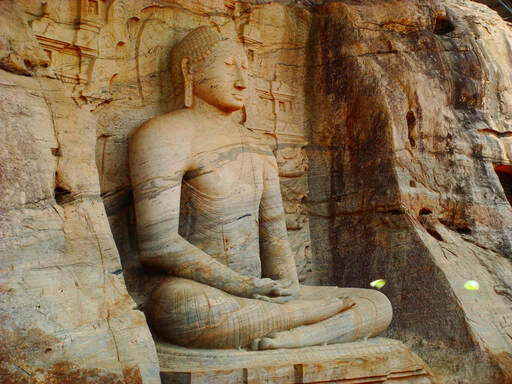Theravada Buddhism
The Teaching of the Elders
Ancient Path in a Modern World

We are part of the oldest living Buddhist tradition in the world, Theravada. The teachings come from the Buddha named Sidhartha Gautama, often referred to as the historical Buddha. He was born in India (today Nepal) over 2,500 years ago and discovered not only the cause of suffering in the world, but the way to completely eliminate all forms of suffering, large and small. Because this teaching was available to everyone with a sincere interest to practice it, a group of enlightened disciples formed around him, known as the Noble Sangha.
The teachings of the Buddha, the Dharma, have been preserved in a collection known as the Pali Canon or Sutta Pitaka. This is the most accurate record of what the Buddha and his enlightened disciples taught. Fortunately, these texts have been translated into very modern, easy to understand English so we can explore them for ourselves.
The word Theravada―pronounced TAE ra VAA da (the h is silent)―means teaching of the elders. It is the main form of Buddhism found in Sri Lanka, Thailand, Burma, Cambodia, and Laos.
In the centuries after the Buddha's death, up until the present day, people have been adding their own personal ideas into the teachings of the Buddha. This has resulted in a wide variety of sects and beliefs that lead to much confusion and doubt among those trying to reach the same happiness that the Buddha found. But when we return to the original teachings, we see that the instructions the Buddha gave us are practical and bring both short term and long term happiness. The Buddha encouraged us to compare what we hear to the original words spoken by him and have confidence in those thing that match.
All of the instructions given at the Mahamevnawa (maha may oo NAH wa) monasteries and meditation centres come directly from these original ancient teachings. Together we learn to apply these teachings to our lives so we can experience the same happiness that the Buddha and his enlightened disciples found. Although the Buddha's teachings are ancient, we know you will find the Buddha's understanding of suffering and happiness to still be true today.
Check out our activities to learn more.
The teachings of the Buddha, the Dharma, have been preserved in a collection known as the Pali Canon or Sutta Pitaka. This is the most accurate record of what the Buddha and his enlightened disciples taught. Fortunately, these texts have been translated into very modern, easy to understand English so we can explore them for ourselves.
The word Theravada―pronounced TAE ra VAA da (the h is silent)―means teaching of the elders. It is the main form of Buddhism found in Sri Lanka, Thailand, Burma, Cambodia, and Laos.
In the centuries after the Buddha's death, up until the present day, people have been adding their own personal ideas into the teachings of the Buddha. This has resulted in a wide variety of sects and beliefs that lead to much confusion and doubt among those trying to reach the same happiness that the Buddha found. But when we return to the original teachings, we see that the instructions the Buddha gave us are practical and bring both short term and long term happiness. The Buddha encouraged us to compare what we hear to the original words spoken by him and have confidence in those thing that match.
All of the instructions given at the Mahamevnawa (maha may oo NAH wa) monasteries and meditation centres come directly from these original ancient teachings. Together we learn to apply these teachings to our lives so we can experience the same happiness that the Buddha and his enlightened disciples found. Although the Buddha's teachings are ancient, we know you will find the Buddha's understanding of suffering and happiness to still be true today.
Check out our activities to learn more.


